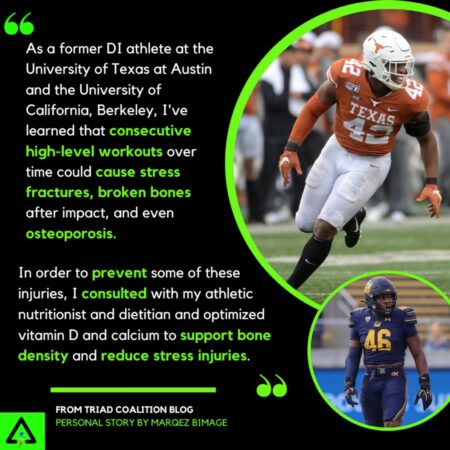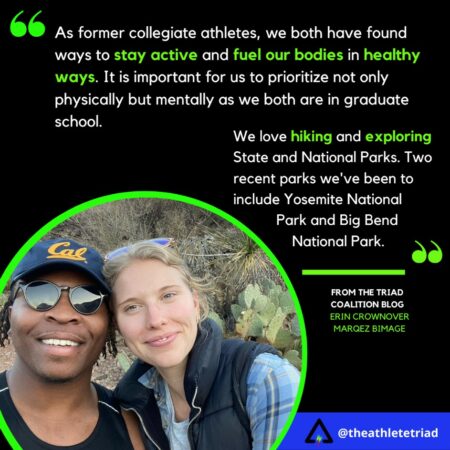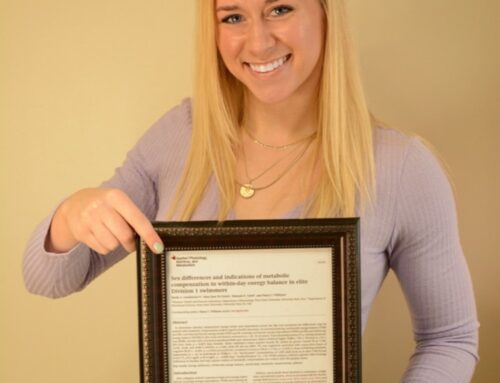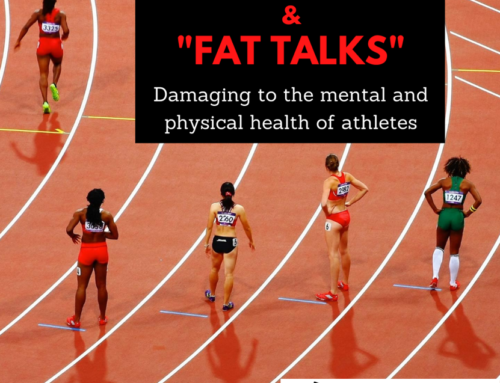Erin’s Story- A Former Collegiate Basketball Player:
I grew up playing all kinds of sports as a child (soccer, swimming, volleyball, softball, basketball, tennis, cross country, you name it). I ended up focusing on basketball when I was in high school and started playing AAU after my freshman year. I was uneducated on training and health and nutrition as an athlete and believed that if I ate anything unhealthy (such as a brownie), I had to run at least 3-5 miles the next day to “burn it off” on top of having basketball practice. I also believed that losing your period meant you were “fit” and “skinny enough.” I ended up being amenorrheic throughout most of high school.
Flash forward to my senior year of high school, I signed a scholarship to play basketball at DII Ashland University (Ashland, OH). It was a dream come true. Right before high school graduation, in the Wisconsin state all-star game, I tore my ACL. It was heartbreaking and I had to redshirt during my freshman year in college. Throughout college, I battled a total of five chronic knee surgeries and did not get the chance to have one full healthy season. Going through so many surgeries increased the negative associations I had with my body. I thought my body was “failing me,” and I struggled with the appearance of how my body looked through each recovery. I felt like I had to be even more restrictive of what I was eating so I did not gain weight since I was immobile for periods of time, and that way I would be “in shape” when I could have a chance to return to the court.
I ended up having to hang up the basketball shoes and focus on finishing my undergraduate degree, followed by making a decision to pursue graduate school at The University of Texas at Austin. It was a very hard transition, as I held onto that athlete identity for SO long. Going to graduate school was a clean slate I thought…no one knew who I was as an athlete. Internally, I was still struggling though. Even though my efforts were so focused on school and this “new identity,” I continued to struggle with my training, health, and nutrition habits. I created unrealistic expectations for what I should do now that I was “no longer an athlete,” and ended up forming negative eating patterns, losing at least 20 lbs during my first year of my master’s. Through a lack of fueling my body and trying to do some form of extensive cardio every day, I developed a painful stress fracture in my surgical leg. My energy status was consistently low as well. What is crazy is that I was a teaching assistant for undergraduate classes, discussing positive relationships with nutrition and health, yet I was not applying it at all to my lifestyle.
During the second year of my master’s, I learned about the Athlete Triad. I learned that there were other young individuals experiencing similar circumstances as myself. I connected with the Triad Coalition and became invested in being a part of it. I could see how distorted my thinking was both when I was healthy playing sports, and also throughout my rehab process. I wasn’t fueling my body properly for how much I was exercising. I was uneducated on the Triad and its consequences, and so were my coaches/athletic trainers/physical therapists/psychologists.
Not only did joining the Triad Coalition help reframe my mindset, but so did forming a relationship with my current partner who played DI football. We started dating towards the start of my second year of my master’s, and he really helped both show and talk with me about the importance of fueling our bodies not just for athletic purposes. It is hard as an athlete not to feel like you have to “perform” all the time and be perfect at it.
Now, I have formed a better relationship with fueling my body and working out consistently because I want to be STRONG. I have more energy and feel more confident about my body and what it can do than I had prior to any knee surgery and when I was playing basketball.

Marqez’s Story- A Former Collegiate Football Player:
I have been playing the game of football since I was five years old in Texas. The camaraderie, teamwork, and dedication to succeed in the sport kept my drive alive. The goal was to make it to the NFL one day, to compete with the best of the best. Throughout my preparation for playing little league football in college, an emphasis on body recovery became an aspect of the game I had to prioritize. In college, I had to fuel my body with the necessary nutrients to elevate my energy levels due to high-intensity training. The days of muscling it through a team run-out were over for me. To compete with my teammates and, ultimately, myself, I had to prioritize fueling options before and after competitions.
I learned about the Athlete Triad in the last year of my bachelor’s degree. It was exciting and beneficial to know that a decline in athletic performance accompanied by low energy availability, low testosterone, and poor bone health constitutes the Male Athlete Triad (MAT) and could relate to numerous young males in collegiate football. The demands to gain and lose weight repeatedly to meet a football position need became detrimental to my physical and mental health as an athlete. I wasn’t fueling my body correctly for the amount of work I was distributing.
The consequences of the Male Athlete Triad can result in decreased bone mineral density, enhancing the risk of bone injuries for an athlete. As a former division one athlete at the University of Texas at Austin and the University of California, Berkeley, I’ve learned that consecutive high-level workouts over time could cause stress fractures, broken bones after impact, and even osteoporosis. In order to prevent some of these injuries, I consulted with my athletic nutritionist and dietitian and optimized vitamin D and calcium to support bone density and reduce stress injuries.






